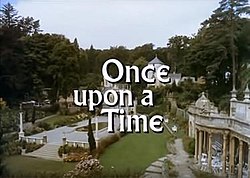Plot summary
The Number Two from the earlier episode "The Chimes of Big Ben" (Leo McKern) returns to the Village. He calls his superiors and obtains permission to undertake a dangerous technique called "Degree Absolute" in a final attempt to break Number Six and learn why he resigned from his position as an intelligence agent. Number Six is put into a trance state, causing his mind to regress back to his childhood. He is taken to the "Embryo Room", deep below the Green Dome, filled with various props, as well as a caged room that contains living space and a kitchen. He, Number Two, and the Butler (Angelo Muscat) are subsequently locked into the room via a timer that will unlock the room after one week.
Number Two uses regressive therapy following Shakespeare's Seven Ages of Man, using the various props to enact a series of psychodramas, with Number Two playing the authority figure (e.g., father, headmaster, employer) and Number Six the subject (child, student, employee). Each drama is aimed at trying to make Number Six explain why he resigned. During the first six of these, Number Two finds Number Six has developed an aversion to saying the word "six". Number Two also comes to like and respect Number Six as he learns more about him.
On the final day, Number Two enacts the role of military jailer, harshly interrogating Number Six as a prisoner of war. Number Two's efforts seem to have effect as Number Six starts to blather on reasons for resigning, but he becomes concerned when Number Six says he knew too much, including about Number Two. Number Two becomes agitated, and Number Six continues to call him a fool and an idiot. Suddenly, Number Six counts down from six, and by the time he has reached zero, has regained full control of his mind. Already exhausted from his efforts, Number Two is shocked. Now in control, Number Six explains that Degree Absolute, a well-known psychiatric technique, has its risks to the one performing the therapy if they have their own psychological problems. Number Six shows this understanding in a brief role reversal (by asking Number Two "Why don't you resign?"), much to Number Two's delighted amusement.
Number Two recovers and joyfully offers Number Six a tour of the Embryo Room. They end at the door timer, finding only five minutes remain before the room unlocks. Number Two becomes scared and pleads with Number Six to tell him why he resigned. Number Six remains quiet as Number Two goes to the kitchen area and pours them both a glass of wine. Number Six suddenly closes the door to the caged area, locking a panicked Number Two inside. The Butler takes the key from Number Two. Number Two paces the caged area while a voice screams "Die, Six, die!", until the timer runs out. Number Two falls over, apparently dead. The door to the Embryo room opens where the Supervisor (Peter Swanwick) waits. He tells Number Six they will need the body and then asks Number Six what he wants. Number Six only replies "Number One", and the Supervisor offers to take him there. He, Number Six, and the Butler depart the room. [1]
Production
A working title of this episode was "Degree Absolute". It was originally reported to be the final episode of the first of two series of thirteen episodes, but when ITC and McGoohan renegotiated to make just seventeen episodes, the closing was refilmed and it was held back to become the first half of a two-part series finale. [4] However, the original script has been published, containing that ending. [5]
According to the 2007 documentary Don't Knock Yourself Out, during filming of the episode both McGoohan and McKern became totally engrossed in their roles and almost achieved a near-psychotic state (cited by various people, including Leo McKern). According to The Prisoner: The Official Companion to the Classic TV Series by Robert Fairclough, the strain of filming this episode caused McKern to suffer either a nervous breakdown or a heart attack (accounts differ), forcing production to stop for a time.
Angelo Muscat (the Butler) received "Guest Star" billing for this episode. John Maxim's brief scene as Number Eighty-Six was cut from the episode; however, he is still listed in the credits.
This page is based on this
Wikipedia article Text is available under the
CC BY-SA 4.0 license; additional terms may apply.
Images, videos and audio are available under their respective licenses.

